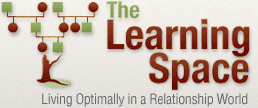The Learning Space Blog
Follow the Leader and/or Think for Self
This issue dogs all regimes that have neither the rule of law nor public accountability: The authorities routinely fail to respect the dignity of ordinary citizens and run roughshod over their rights. There is no culture in which this sort of behavior is not strongly resented. Wall Street Journal, 3/12/11 Is China Next? Francis Fukuyama
Coach Byrnes told me I was worthwhile and good and that we could win. He talked to me as if I were someone worth telling a story about, subtly enjoining me to become active in that story. My father was mostly gone by then, and now here was a man who respected me by demanding that I respect myself, and a game. I never knew if he liked me. That wasn’t so important. He saw potential in me, and I began to respect myself. That is what a good coach does. He fills you with a belief that may or may not be justified. As you make the dangerous crossing from unproven belief to actual accomplishment, from potential to reality, a good coach holds your hand so expertly that you don’t even know your hand is being held. Wall Street Journal, 3/12/11: What a Good Coach Does, David Duchovny
Even dogs like to have a good leader. Yes, the leader spends a lot of time behind the dog, giving the dog room to roam. Meanwhile the butterfly of uncertainty looks on.
Relationships are at the center of our existence. We take clues from one another and at the extremes we can either be held hostage or inspired by one other.
We influence each other in families and in society, giving birth to patterns in relationships systems whose influence reaches beyond one or two generations.
Much of the time we can afford to be blind to the ongoing influences in these social emotional systems. Our automatic programming seems to suffice, especially when life is good and comfort dominates. There is little need for awareness or the risk inherent in change. When life is difficult, confusion and uncertainty forces us to understand difficult or even profound problems in order to adapt well to these challenges.
This week the human family watched in sorrow and fear, the unsettling news that appeared out of the blue. An earthquake and tsunami struck Japan, destroying many lives. The usual methods of communication and even of distributing food and water were disrupted. Great danger still lurks, especially in the damage to nuclear power plants. Now people have to take care of one another while the government tries to solve serious problems.
Like many people this became personal. I have a dear friend who lives in Tokyo, Ryuko Ishikawa, who is part of my extended family. When I finally heard from her I was relieved. Like many who feel connected to and act to decrease the suffering of others, we respond without thought. Automatically we reach out to those whose suffering we sense. We respond instantly to clear issues in relationship systems, such as the danger and suffering in the case of the Japanese earthquake. Read More....
Filed under Bowen family systems theory
Comments are closed for this post.
Blog Categories
Blog Archive
- June 2012
- March 2012
- February 2012
- January 2012
- December 2011
- November 2011
- October 2011
- September 2011
- August 2011
- July 2011
- December 2010
- November 2010
- October 2010
- September 2010
- May 2010
- July 2011
- June 2011
- May 2011
- March 2011
- January 2011
- July 2014
- June 2014
- May 2014
- April 2014
- March 2014
- December 2013
- October 2013
- August 2013
- July 2013
- June 2013
- April 2013
- February 2013
- January 2013
- December 2012
- August 2012
- July 2012
- June 2019
- December 2018
- October 2018
- June 2017
- February 2017
- July 2016
- February 2016
- November 2015
- August 2015
- June 2015
- April 2015
- February 2015
- December 2014
- October 2014
- September 2014
- August 2014
About the Learning Space
"The Learning Space is a creative, energetic thinking space for individuals striving to live optimally in all their most important relationships. The Learning Space provides a conceptual space—a place to consider and experience alternate ways of relating."
Read More »
Upcoming Events
view events »Newsletter
Fill out the form below to subscribe to The Learning Space's quarterly newsletter, and get exclusive invitations to special learning forums and other events.

